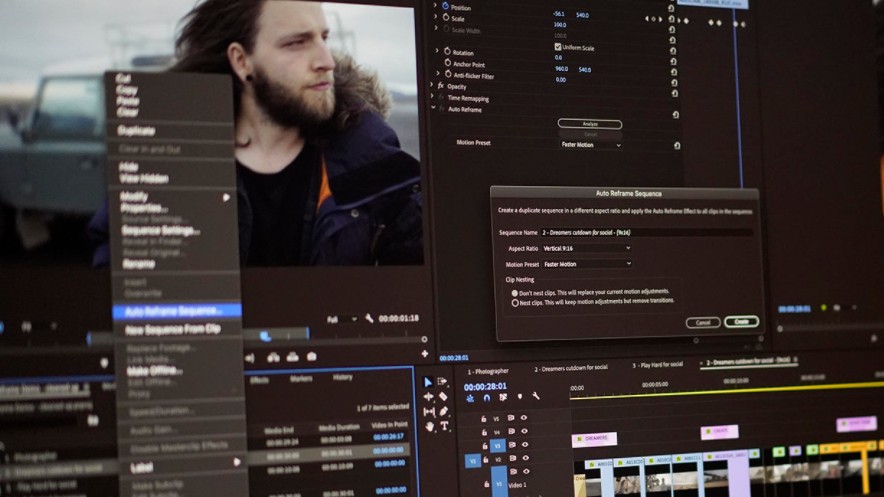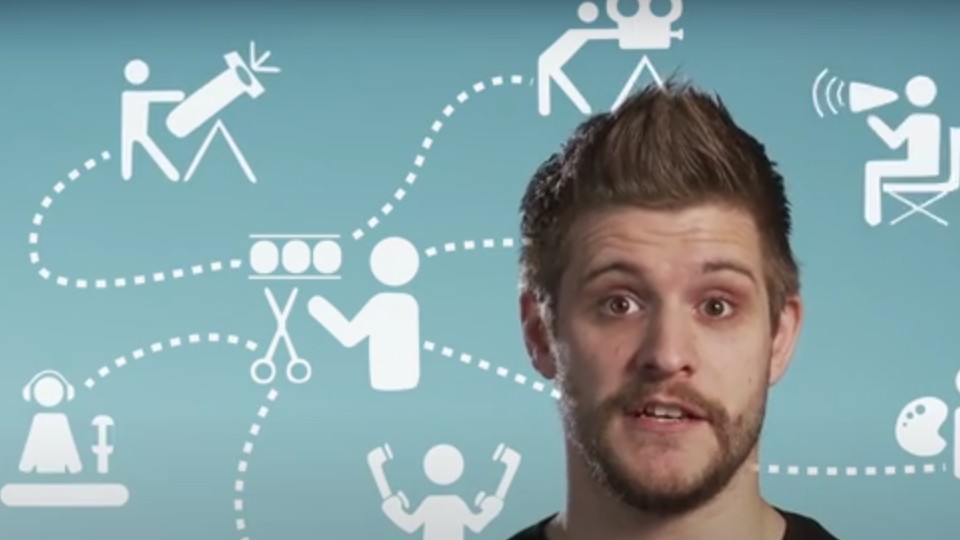
Want to work in the media and entertainment industries? Video editor isn't the job that immediately springs to mind, but it's one that's definitely in demand right now.
As the battle for streaming supremacy rages between Netflix, Amazon, Disney+, HBO Max and others, more and more TV and film content is being created, and it all needs editing. This has prompted the Bureau of Labor and Statistics in the USA to project the profession will grow by 11 per cent between 2018 to 2028.
So could this be the creative career (or career change) for you? Read on as we explain everything you need to know about becoming a video editor in 2020. And don't miss our round up of the best video editing software too.
01. What a video editor does

Video editing, as the name suggests, is the job of editing and joining together segments of video footage, audio footage, VFX, graphics, music, sound effects and other elements in post-production, using specialised computer software, to create polished, finished content. It's central to all types of video production, including films, TV shows, commercials, music videos, documentaries, news and sports events, social media video, VR experiences, and more.
Professional editing is far more complex than the kind of small edits you might do on your holiday Go-Pro footage or piece to camera for YouTube. A typical video editor working on a reality TV show, for example, may have to wade through footage from four or five cameras, each running for 20+ hours, just to create one 20-minute episode.
Video editing is normally done in an office, although during the pandemic most video editors have been working from their home computers. Either way, you probably won't spend much time actually on set, at least until you reach a very high level of video editor where your work starts to merge into more supervisory and directorial roles.
02. How much a video editor makes
Good video editors are currently in demand, and that's a trend that's set to continue. And this fact is reflected in the salaries for video editors, which are on par with some of the better paid jobs in the creative industries.
Specifically, in the UK's National Careers Service puts the range of salaries between £18,000 (for new starters) and £45,000. In the US, meanwhile, the average pay for film and video editors ranges from $26,560 to $110,790 as of May 2019, according to the U.S. Bureau of Labor Statistics.
03. Skills a video editor needs

Video editing requires specialised software, so a video editor needs to master such tools. However, video editing is far from just a technical challenge; more significantly, it's also a creative one. You need to have a strong understanding of both aesthetics and storytelling, because you must be able to see in your mind's eye what the final result should look like to an audience, in order to best tell that story visually.
A successful video editor needs to be focused and pay keen attention to detail in their work, and also have a strong work ethic: given the relentless pace of the industry, it's not suitable for artistic types who like to work only when inspiration takes them. You also need to be a good problem solver, as video editing often presents intractable puzzles, such as how to cut a segment by 30 seconds without sacrificing certain essential elements of the narrative.
Finally, you also need good communication skills, as a video editor is often required to liaise with other production staff, including the director, in order to ensure filming runs smoothly and content is delivered to deadline.
04. What qualifications do you need as a video editor?
You don't need a degree to become a video editor. Some companies specifically advertise for graduates in related subjects, and it certainly won't do any harm to have a degree in something like film and television studies, media production or film and media. But in general, employers are much more interested in your ability to actually do the job.
And here lies the problem. Entry-level positions commonly require experience, begging the age-old question: "How do I get experience without a job?" The answer, in a very competitive environment, basically boils down to: "By exploring every avenue you possibly can."
05. How to get training and experience as a video editor

Training and experience as a video editor are very much intertwined. You can't start working as a video editor without training of course, because you first need how to use the software, and understand the basic concepts and processes of video editing. But work experience is an essential part of training, because video editing is such a collaborative process that learning on the job is the only way to really get your head around it.
Initially then, you'll need to take a formal course of some kind (there are some entirely self-taught video editors, but they remain the exception). This could be based at a college or university; for instance in the UK, you'd do well to take a Level 3 or Level 4 Diploma in Creative Media Production. Alternatively, if you can't afford to the time and money demanded by full-time study, you could opt for the flexibility an online course can offer. But of course, you'd want to ensure it was a good one; and being expensive doesn't necessarily make it so. Ask the course providers if they can provide evidence that graduates go on to get jobs in the industry; if they go quiet, you'll have your answer.
You'll also need to get to grips with video editing software, which will probably involve a degree of self-study even if it's an integral part of your course. And then once you're ready, it means seeking out experience wherever you can find it. The dream would be to get a training scheme run by a broadcaster like the BBC, but most budding video editors will have to look elsewhere for internships, apprenticeships and work placements.
This will probably mean sending out a lot of enquires to production companies, advertising agencies, design studios and others, along with the best showreel you can put together... and dealing with a lot of rejections.
It will also, in all honesty, mean having to fund yourself while doing a lot of working for free. Much like the situation in other creative professions, this is not ideal, and discriminates hugely against people from disadvantaged backgrounds. But it is unfortunately the present reality for this highly competitive profession. On the plus side, the rewards for perserverance in the long term should be rewarding and creatively fulfilling work, at decent levels of compensation.
Read more:

Thank you for reading 5 articles this month* Join now for unlimited access
Enjoy your first month for just £1 / $1 / €1
*Read 5 free articles per month without a subscription

Join now for unlimited access
Try first month for just £1 / $1 / €1
Get the Creative Bloq Newsletter
Daily design news, reviews, how-tos and more, as picked by the editors.

Tom May is an award-winning journalist and editor specialising in design, photography and technology. Author of the Amazon #1 bestseller Great TED Talks: Creativity, published by Pavilion Books, Tom was previously editor of Professional Photography magazine, associate editor at Creative Bloq, and deputy editor at net magazine. Today, he is a regular contributor to Creative Bloq and its sister sites Digital Camera World, T3.com and Tech Radar. He also writes for Creative Boom and works on content marketing projects.
